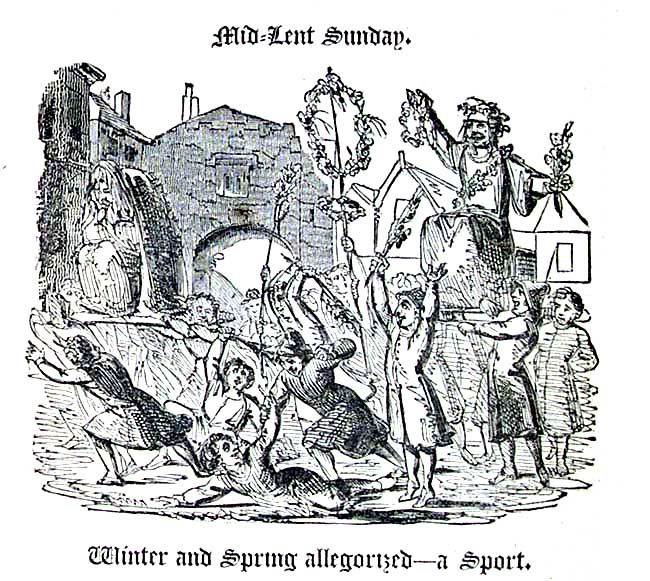March 13.
St. Nicephorus, Patriarch of Constantinople, A.D. 828. St. Euphrasia, A.D. 410. St. Theophanes, Abbot, A.D. 818. St. Kennocha, A.D. 1007. St. Mochoemoc, in Latin, Pulcherius, Abbot, A.D. 655.

Winter and Spring allegorized—a Sport.
Mothering Sunday. — Refreshment Sunday. — Rose Sunday.
This is the fourth Sunday in Lent, and noted as a holiday in the church of England calendar.
On this day boys went about, in ancient times, into the villages with a figure of death made of straw; from whence they were generally driven by the country people, who disliked it as an ominous appearance, while some gave them money to get the mawkin carried off. Its precise meaning under that form is doubtful, though it seems likely to have purported the death of Winter, and to have been only a part of another ceremony conducted by a larger body of boys, from whom the death-carriers were a detachment, and who consisted of a large assemblage carrying two figures to represent Spring and Winter, whereof one was called "Sommer stout"—
Apparelde all in greene, and drest
in youthful fine arraye;
The other Winter, cladde in mosse,
with heare all hoare and graye.*[1]These two figures they bore about, and fought; in the fight Summer, or Spring, got the victory over Winter, and thus was allegorized the departure or burial of the death of the year, and its commencement or revival as Spring. The custom described on March the 6th, (p. 339,) was only a variation of the present, wherein also the boys carried about cracknels or cakes:—
Thus children also beare, with speares,
their cracknelles round about. [2]It is still a custom on Mid-Lent Sunday in many parts of England, for servants and apprentices to carry cakes or some nice eatables or trinkets, as presents to their parents; and in other parts, to visit their mother for a meal of furmity, or to receive cakes from her with her blessing. This is called going a mothering. ‡ [3] Herrick mentions this custom in Gloucestershire:
I'le to thee a simnell bring
'Gainst thou go'st a mothering;
So that when she blesseth thee
Half that blessing thoul't give me.Going a mothering is from the Roman catholic custom of going to the mother-church on Mid-Lent Sunday, to make offerings at the high altar; and that custom of the romish Church is derived from the Hilaria, a heathen festival celebrated by the ancient Romans, in honour of the Mother of the Gods on the ides of March.§ [4] The offerings at the altars were in their origin voluntary, and became church property. At length the parish priests compounded with the church at a certain sum, and these voluntary donations of the people have become the dues known by the name of Easter Offerings.
Mid-Lent, or Mothering Sunday is likewise called Refreshment Sunday, "the reason of which," says Wheatly, (on the Common Prayer) "I suppose is the Gospel for that day, which treats of our Saviour's miraculously feeding five thousand; or else, perhaps, from the first lesson in the morning, which gives us the story of Joseph entertaining his brethren." It is also denominated Rose Sunday, from the pope on this day carrying a golden rose in his hand, which he exhibits on his way to and from mass.* [5]
On this day at Seville there is an usage evidently the remains of an old custom. Children of all ranks, poor and gentle, appear in the streets fantastically dressed, somewhat like English chimney-sweepers on May-day, with caps of gilt and coloured paper, and coats made of the crusade bulls of the preceding year. During the whole day they make an incessant din with drums and rattles, and cry "Saw down the old woman." At midnight, parties of the commonalty parade the streets, knock at every door, repeat the same cries, and conclude by sawing in two the figure of an old woman representing Lent. This division is emblematical of Mid-Lent. † [6]
FLORAL DIRECTORY.
Heartsease. Viola Tricolor.
Dedicated to St. Euphrasia.